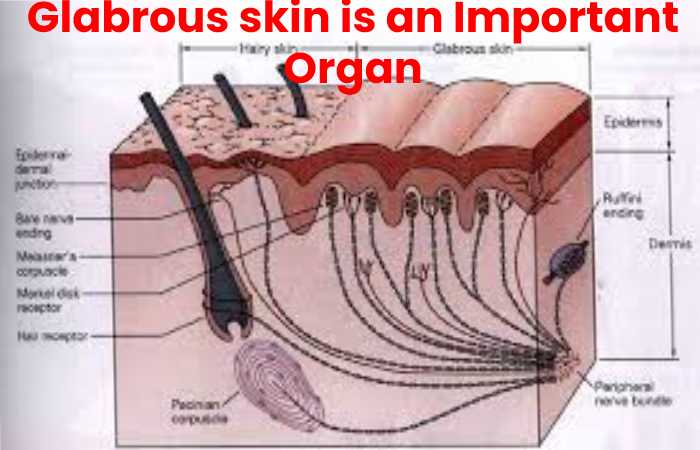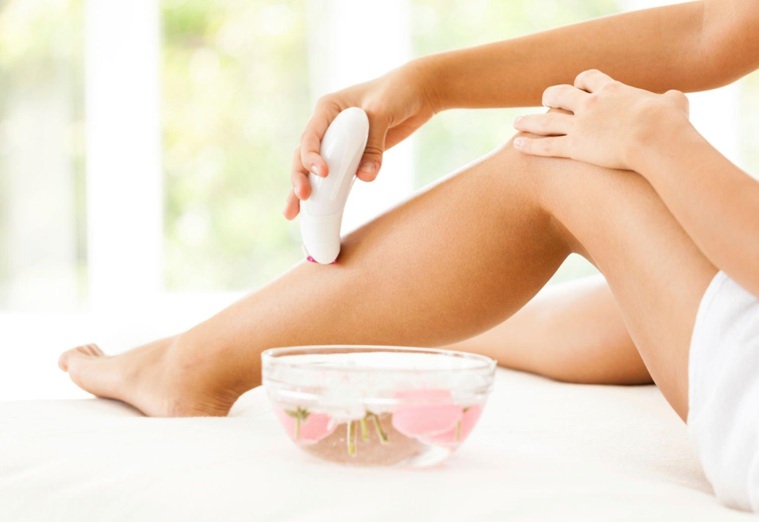Glabrous Skin: Glabrous skin is limited to the volar surfaces of the hands and feet, the umbilicus, the nipple, the lip margins, the medial surfaces of the labia majora and the entire labia minora glans penis, and the prepuce in men.
Dermal filaments such as hair or feathers are absent in glabrous skin. It is common in amphibians and reptiles and remains found in the maxillary rictus, interdigital web, bird combs and wattles. The glabrous skin of birds is lipogenic and can be temporary, such as brood (incubation) patches or associated with maturation.
For example, feather loss from the head remains associated with growth in some ibises and storks. Mammals’ glabrous skin is more variable are glabrous, as are parts of limb extremities in contact with the physical environment during locomotion, such as seal and sea lion flippers and cutaneous paw pads.
The prehensile tails of atelid monkeys and other arboreal mammals also have a patch of glabrous skin. When moving or foraging on terminal branches, such animals typically suspend their bodies via their tail. The nasal rays of the star-nosed mole, Condylura cristata’s upper bill of the platypus.
And Ornithorhynchus anatinus, an extension of skin that covers much of the face, are more specialised examples of glabrous skin. A similar extension folds over the neck at the proximal end of the lower bill. These remain referred to as the upper and lower shields, respectively.
Table of Contents
Glabrous skin is an Important Organ

Glabrous skin is an essential organ for sensing the outside environment. Sensation from glabrous skin and hairy skin, muscles, tendons, joints, and bones is known as somatic sensation. It remains triggered by a wide range of specialised receptors, many of which have structurally complex terminals that convert specific stimuli into nerve impulses.
The sensory terminal can be encased or connected to mesodermal or ectodermal elements. Extraneural cells are not necessarily excitable but create the right conditions for neuronal dendrite excitation or modify its excitation. Some receptors are remarkably uniform across vertebrate and mammalian orders.
Still, there is considerable variation in the number of sensory receptors per square centimetre among different body surface areas, and receptor density can decrease with age. Not surprisingly, the adaptive function of glabrous skin and its associated receptors varies according to a species’ locomotor, foraging, and reproductive behaviours.
The Ringworm of Glabrous Skin (Tinea Pedis, Corporis, Manual)
Topical Treatment
If possible, topical therapy remains used to treat these dermatophyte infections, though most nail and hair infections and widespread dermatophytosis remain best treated with oral medications. 37 The most commonly used topical agents for dermatophytosis are antifungal compounds. Keratolytic agents like Whitfield ointment (a salicylic and benzoic acid compound) are no longer widely used. Currently, many specific antifungal agents remain used in treating dermatophytosis, though some of these remain primarily used to treat tinea pedis.
Topical azole antifungal managers such as miconazole, clotrimazole, econazole, tioconazole, ketoconazole, luliconazole, efinaconazole, bifonazole, and isoconazole are the most commonly used medications.
Effective Against all Common Skin Fungi
Many of these are effective against all common skin fungi and can remain used once daily. Other effective antifungal topical agents are used to treat. Dermatophytosis include ciclopirox olamine, tavaborole, terbinafine, and naftifine. Based on well-conducted comparative studies, it isn’t easy to choose among the various groups of these agents.
A Cochrane Review of topical actions for tinea cruris and corporis discovered numerous biases and low-quality evidence. Still, it concluded that data suggested that topical terbinafine and naftifine were effective. 38 Furthermore, older preparations like chlorphenesin, undecylenate, and tolnaftate are available in cream or, in some cases, powder form and are effective in simple cases.
Tinea pedis topical therapy must continue for at least two or four weeks. Terbinafine topical can remain used to clear tinea pedis lesions for seven days and is also available as a single-dose film-forming solution that can remain applied to the soles of the feet. Tinea cruris usually respond to treatment within 2 or 3 weeks. Some azole agents can only be used once per day.
Systemic Treatment
Terbinafine, itraconazole, and fluconazole are the most commonly used oral antifungal agents for dermatophytosis. Griseofulvin is an older alternative treatment still used in Microsporum-caused tinea capitis. 39 Headache, nausea, and abdominal discomfort are some side effects.
However, Urticaria, diarrhoea, and photosensitivity are less common reactions. Unfortunately, newer triazoles, like Posaconazole and voriconazole, are expensive and underutilised medications. Terbinafine is administered in 250 mg doses daily for two weeks to treat tinea cruris or corporis.
It cures dry-type dermatophytosis and other skin infections quickly and permanently. Itraconazole can be given continuously at 200 mg daily for one week and is curative for tinea cruris or corporis. Fluconazole can also remain used to treat dermatophytosis. But current regimens range from 150 to 300 mg weekly for skin infections.
Glabrous Skin Epilator

Glabrous skin is smooth, hairless skin found on areas with minimal hair growth, like hands and feet. Epilators are used for hair removal but not on glabrous skin. Techniques like shaving, waxing, or laser hair removal may suit glabrous skin. Always follow the manufacturer’s instructions when using any hair removal device.
Conclusion:
All three drugs are well tolerated and are effective in glabrous skin ringworm. 40,41 In patients with comorbidities, drug interactions may limit the use of itraconazole or terbinafine. In addition, interactions with antidepressants and -blockers may make terbinafine use contraindicated. Drug interactions are even more familiar with itraconazole.\
Search
Chinesische Akrobatik & Shanghai Abendbusreise
Also read : Tea Tree Oil for Skin – Benefits, Treatments, And More.

